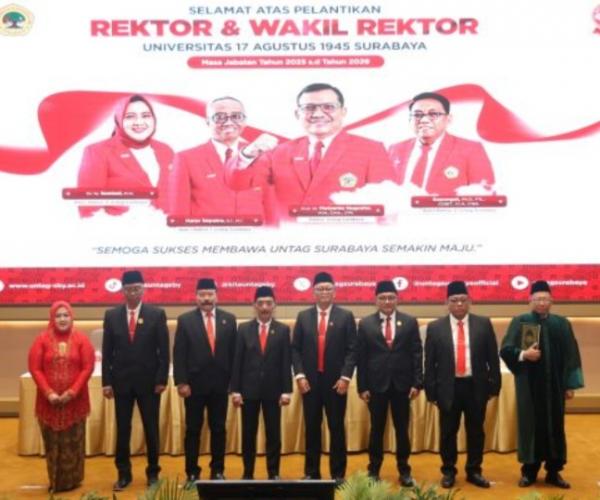SURABAYA – The August 17, 1945 University (Untag) Surabaya has entered a new chapter of leadership after Prof. Dr. Mulyanto Nugroho was once again entrusted to serve as Rector for the 2025–2029 term. The inauguration, which took place on Tuesday, also marked a new formation of the leadership team with the arrival of two fresh faces expected to lead the «Red and White» campus to even greater achievements.
The two new figures are Supangat, M.Kom., ITIL., COBIT., CLA, who is entrusted as Vice Rector II, and Sumiati, MM, who serves as Vice Rector III. Both are known to have solid academic track records with dozens of published research works.
Supangat, who specializes in digital technology, has produced more than 20 research studies, while Sumiati is far more productive with 90 widely recognized studies. One of her most phenomenal works is a research titled «The Influence of Product Quality and Price on Purchase Decisions for Wardah Cosmetic Products in Bangkalan City,» published in 2016 and reviewed by hundreds of academics to date.
Meanwhile, Prof. Mulyanto, or affectionately known as Prof. Nug, is entering his third term as rector. He will be assisted by Harjo Seputro, ST, MT (Vice Rector I), Supangat (Vice Rector II), and Sumiati (Vice Rector III). This formation is expected to accelerate Untag’s grand vision of improving the quality of education to international standards while strengthening the campus identity that upholds the values of patriotism.
In his speech, Prof. Mulyanto emphasized that the challenges of higher education in the future are increasingly complex, so Untag Surabaya must dare to go further.
«Since 2018, we have opened four international study programs. In 2021, three of them successfully obtained international accreditation. This year, we are targeting four additional programs, bringing the total to seven with international standards,» he said.
In addition to internationalization, Prof. Mulyanto emphasized the importance of implementing the Four Pillars of Higher Education. One of them is through compulsory patriotism education from undergraduate to doctoral levels.
«The Red and White Campus has a responsibility to instill national values. This is in line with the Pancasila Village program initiated by the Surabaya City Government,» he added.
Untag Surabaya is also continuously expanding access to education through cooperation with local governments. Last year, the Surabaya City Government provided full scholarships to 17 vocational program students. In the future, this educational assistance scheme will be expanded so that more young people in Surabaya have the opportunity to pursue higher education.
The leadership of Prof. Mulyanto has proven capable of maintaining campus solidarity. The major challenge for private universities is competing with state universities with legal entity status that attract many high school graduates, as well as the entry of foreign campuses into Indonesia.
«In Surabaya alone, there are already two universities from Australia. Parents with high economic capacity will certainly consider foreign degrees. Therefore, Untag must strengthen its own appeal through quality and internal cohesion,» he emphasized.
Appreciation also came from the Mayor of Surabaya, who praised Prof. Mulyanto’s dedication in bringing significant change since his first term. «The first and second terms have brought great leaps for Untag Surabaya. In this third term, I hope collaboration with the City Government can be strengthened further, including through student community service programs to assist the community in Pancasila Village,» he said.
The Surabaya City Government is also preparing the Resilient Youth Scholarship program aimed at students in private universities, including Untag. With this scheme, it is hoped that no more young people in Surabaya will be hindered from continuing their education due to financial constraints. «We want to ensure that the children of Surabaya can still attend college, so that the city’s Human Development Index continues to improve,» he added.
With a combination of experienced leadership and the presence of two new academic figures, Untag Surabaya is optimistic about being able to face global challenges while remaining steadfast in its identity as a campus of struggle.


